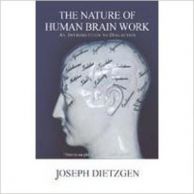Joseph Dietzgen

Joseph Dietzgen
Born near Cologne in 1828, Joseph Dietzgen worked most of his life as a tanner. A self-educated man, he participated in the Revolution of 1848 where he first read the writings of Karl Marx and became one of his supporters. Exiled from Germany after the failed revolution, he spent time in both America and Russia, where he wrote his most famous work The Nature of Human Brain Work, published in 1869, before returning to Germany. In 1884 he moved to the United States for the third and last time after being imprisoned in Germany for his political writing. He became editor of the anarchist Chicagoer Arbeiterzeitung when its previous editors were hung by the State in response to the Haymarket bombings. When he died 2 years later he was buried beside them in Chicago.
-
 The Nature Of Human Brain WorkINR 195
The Nature Of Human Brain WorkINR 195Dietzgen Examines what we do when we think. He discovered that thinking is a process involving two opposing processes: generalization, and specialization. All thought is therefore a dialectical pro...

Jerry Pinto
Jerry Pinto is the author of the novels Murder in Mahim (2017) and Em and the Big Hoom (2012; winner of the Hindu Prize and the Crossword Book Award), and the non-fiction book Helen: The Life and T

John G. Neihardt
John Gneisenau Neihardt (8 January 1881 – 24 November 1973) was an American poet, writer and ethnographer.

Rosy Thomas
Rosy Thomas, well-known Malayalam writer and translator, married Malayalam playwright and literary critic, C J Thomas, in 1951, when he was a professor at her father’s tutorial college in Changan

Lawrence Liang
N/A
S. V. Rajadurai
S. V. Rajadurai (pseudonym for K. Manoharan) is a well-known Tamil writer and translator who has long been involved with the radical Left and the civil liberties movement.
Ashish Kothari
Ashish Kothari is with Kalpavriksh and Vikalp Sangam in India, and co-editor of Alternative Futures: India Unshackled.

Renu Addlakha
Renu Addlakha is a Senior Fellow and Professor at the Centre for Women's Development Studies.
